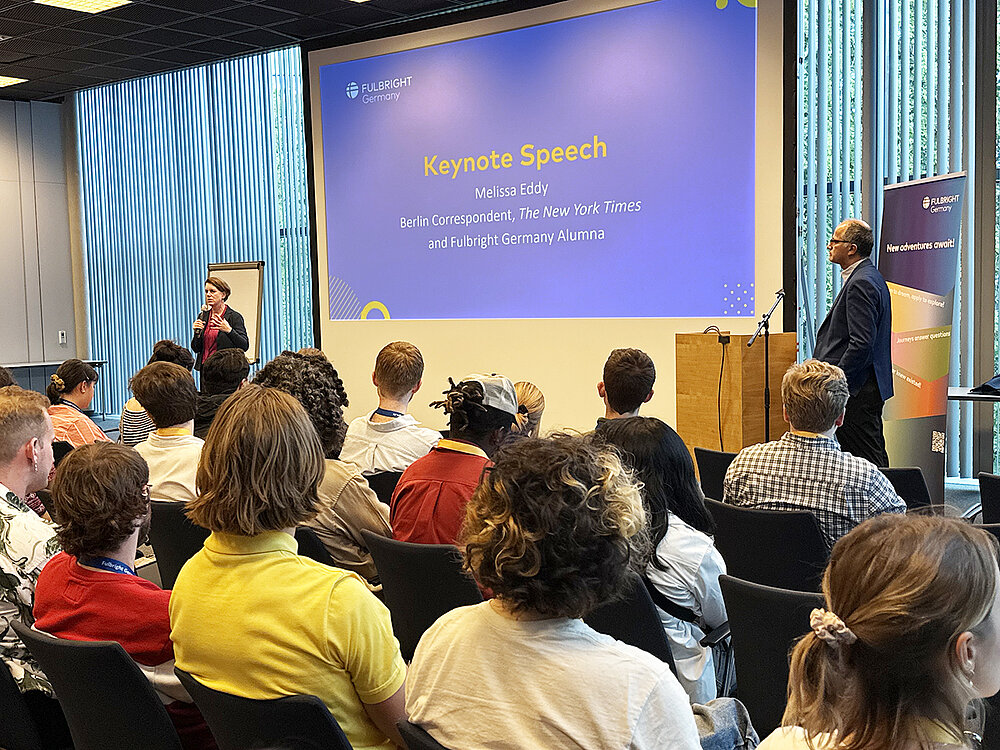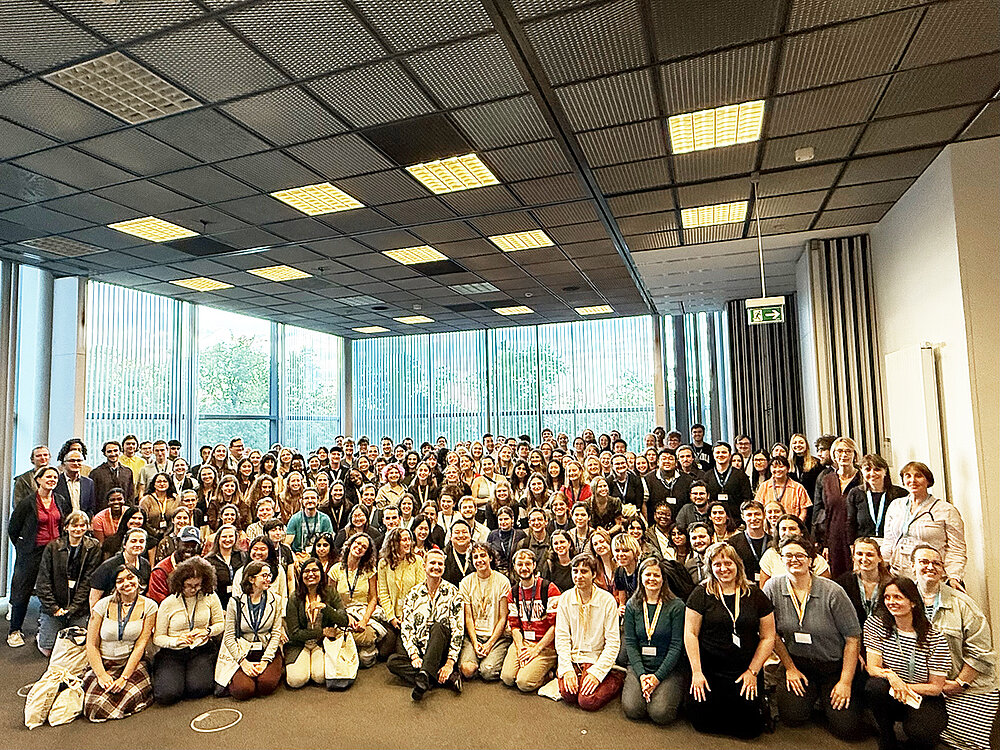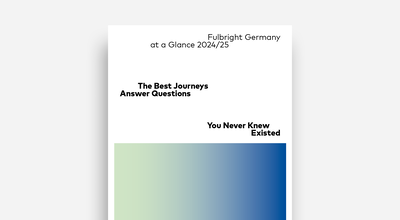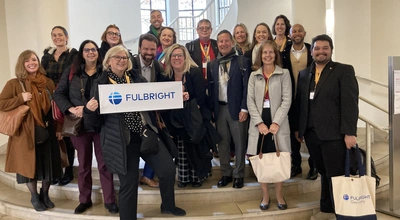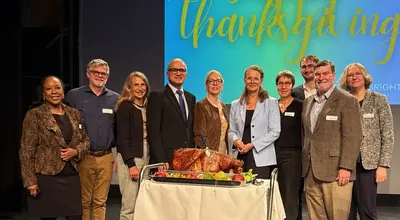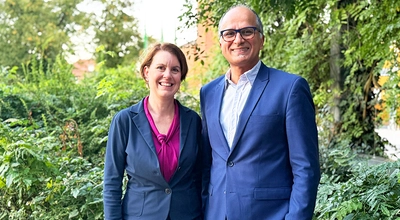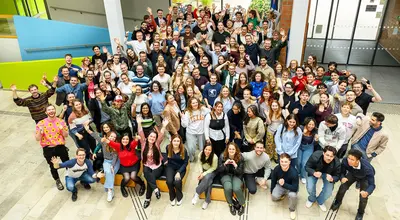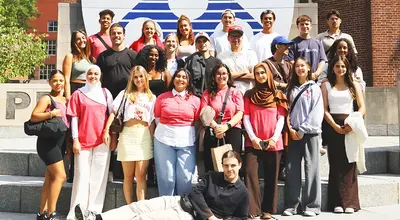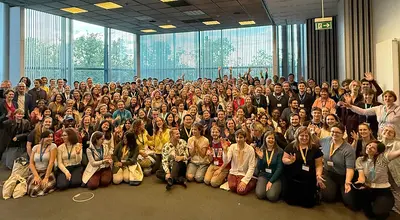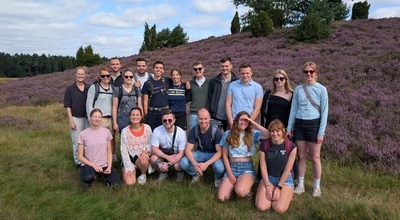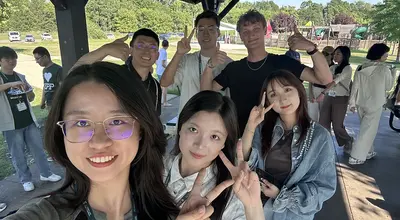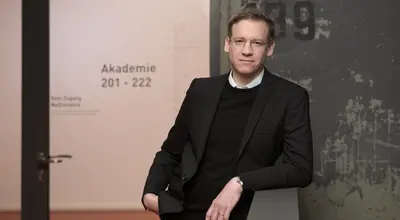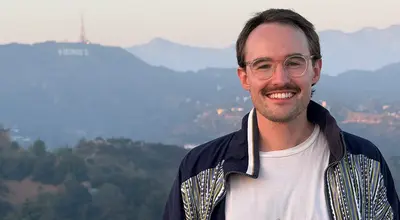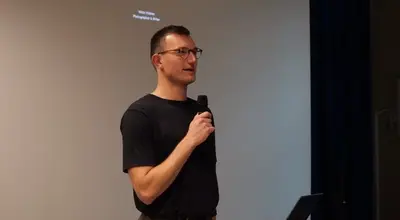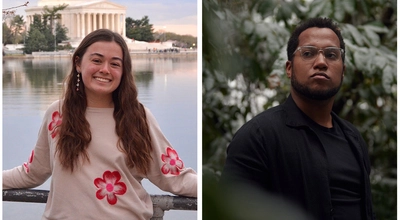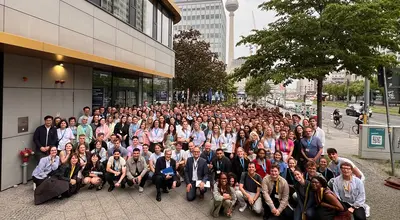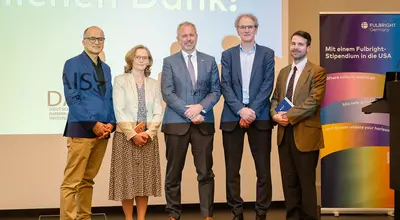Keynote by Melissa Eddy: Fulbright US Journalist to Germany 1996/97

Melissa Eddy and Fulbright Germany Executive Director, Hakan Tosuner
During our Welcome Weekend in September, we were delighted to host Melissa Eddy as the keynote speaker for the 2025–26 cohort of U.S. Fulbright grantees to Germany.
Born and raised in a small town on the Mississippi River in Minnesota, Melissa first came to Berlin, Germany as a Fulbright grantee in 1996 - and has been covering the country ever since. She holds a Master’s degree in Journalism from Columbia University and a B.A. from Bucknell University. Over the years, she has reported on a wide range of events and developments shaping Germany and Europe, offering insightful and nuanced coverage for international audiences.
In her keynote, Melissa reflected on her own Fulbright experience and her path as a journalist, highlighting the importance of curiosity, cross-cultural understanding, and the stories that connect people across borders.
Fulbright Speech, Sept. 23, 2025
By Melissa Eddy
Good afternoon/evening and welcome to all of you. Welcome and congratulations. You are sitting here because you have been chosen to partake in what J. William Fulbright in his definition of intercultural exchange called “the acquisition of empathy,” between nations and cultures.
In all of your fields -- whether you are here to teach in German schools or universities, carry out research at the Max Planck or Helmholtz institutes, perform music or theater on storied stages or those of you who are here to learn from Germany’s journalistic principles and values – all of you are part of a tradition that has been carried out by your peers from earlier generations since 1953, when the German-American Fulbright exchange was founded.
You come at a time when the transatlantic relationship finds itself facing new challenges. At a time when countries across Europe and North America are increasingly turning inward. A time when national interests are taking precedence over international and even global ties in many capitals and institutions.
But this is not the first time we have experienced this. It also does not mean that transatlantic ties do not still exist. They do. And in many cases, more so than ever, because in a world where we can send messages to our friends and family back home and get a response in real time, the world is in many ways is much more deeply intertwined than it was when this, our program, was founded.
But it also means that misunderstandings and misperceptions can move rapidly as well. Comments or remarks taken out of context or blown out of proportion, can quickly leave people feeling angry and alienated. Without the chance to sit across the table from someone, over a coffee, a beer or even just at opposite ends of a park bench, we can all too easily forget that true understanding and empathy thrive in the live exchange of thoughts and ideas between people.
In your time here, you will find that Germans care very deeply about the United States. They follow its politics to an extent that even after 25 years of living here still never fails to surprise me.
When I arrived in Germany on my Fulbright grant, less than a decade after the fall of the Berlin Wall and reunification, the country was still in the process of stitching itself back together. As a Fulbright Young Journalist, I had the opportunity to travel through some of the small towns in Brandenburg, just outside of Berlin. Through an internship that Fulbright helped me set up, I found myself working with a team of reporters for a television station that now no longer exists, Ostdeutsche Rundfunk Brandenburg, or ORB.
Its logo was the outline of a blue cloud over a green line – depicting the fields of Brandenburg - with the wide, red “V” of an eagle soaring over it. Most people knew it simply as “der Sender mit der Wolke,” or the station with the cloud.
It had been formed as a catch-all for the reporters and producers who worked at the former East German broadcaster in Potsdam, along with camera and soundmen – they were all men at that time – who before the fall of the wall had all been trained and worked at DEFA, the state film studio of the GDR.
This was in 1997, and I was one of the first Americans that most of those colleagues had ever really met and spent time with. On days that we would go out into Brandenburg to shoot and report a story, they would pepper me with questions about life in the United States. They wanted to know about the cars we drove, the food we ate and, one of them asked me about how we voted and whether I thought it worked.
We would travel together to small towns to speak with people about their experience, many of which involved the difficulties and challenges of reunification.
For many of the people we would interview, just speaking with the press was something entirely new and foreign. My German at the time was relatively fluent, but I did not always understand their accents. But a bigger problem was that when they realized that I was an American, they had many more questions for me.
More than once, we would have to break off an interview had been interrupted by our interview partner interjecting, “Do you have that in America?” or “Would something like this ever happen in America?” We would have to get them to start over, urging them to stay focused on the topic, but promising that afterward, they would have the chance to ask me question.
As someone who grew up with a yearly rotation of exchange students, including many from the former West Germany, rotating through my high school, and who had had the privilege to travel to Europe as a teen-ager, their reactions surprised and touched me. They were genuinely curious, usually about some of the most mundane aspects of daily life in the U.S. Nearly all of them invited us in for a coffee and I often wished that I had more time to spend with them.
Looking back, I realize that this is what Fulbright had intended when set up this program. Not just the formal exchange between institutions, but the direct person-to-person contact, the Austausch of ideas, impressions and experiences that shape our impressions of one another and inform our decisions.
In the forward to the book, The Fulbright Program: A History, published in 1965, Senator Fulbright wrote that:
- "The Program aims … to bring a little more knowledge, a little more reason, and a little more compassion into world affairs and thereby to increase the chance that nations will learn at last to live in peace and friendship."
In reading this, I was struck by two points – firstly, how very lofty that is. And secondly, his use of the word “compassion.”
In describing his aspirations for the program in its earliest years, Senator Fulbright would often use the word “empathy” -- which for the linguists among you, is derived from the word “sympathy” and the German, Einfühlung.
According to Merriam-Webster, both empathy and compassion involve the capacity to share the feelings or emotions of another person. But compassion takes things one step further. Compassion involves taking action, usually with the idea of relieving someone’s distress. But it can also be listening, being present or providing emotional support. Or, compassion can involve using your position to advocate for someone else.
When we think of the transatlantic relationship, it can be difficult to conceive of how compassion can come into play. I mean, we are talking about the complexities of geopolitics at the highest level, influenced by any number of factors that seem to be beyond our control, even as individuals participating in an exchange program.
For a recent story, I traveled to Bailingen, a small town in the hills of Baden-Württemberg. I met and spoke with Andreas Kraut, who is the head of a family-owned company, there, that is one of the world’s leading producers of slicers for deli meat and cheese, including those used in Subway stores across the United States.
I was interested in how he was thinking about the newly introduced 15 percent tariff on goods coming into the United States from Europe. I knew that the United States was his company’s largest and most important market, and I wanted to know how these levies would affect his business.
But before he answered that question, he wanted to tell me about the five years that he spent living in New Jersey. He proudly recounted that two of his three sons had been born there and were U.S. as well as German citizens.
And that he appreciated what he saw as the American approach to solving problems, which he summed up by quoting the Nike slogan – “Just Do It.” He compared that with the German tendency to form a round table to discuss the problem, before drawing up a report to define the problem and then setting up another round table to decide on how to solve the problem.
Every year, he said that he sends employees from his factory in Germany to the company’s plants in the United States to work with employees on the American side, so they can better understand the market and the of customers over there.
This led him to say that although the tariffs would cost his company money and force them to rethink their production locations and supply chains, he also said that he had a certain level of understanding for why they had been put into place. Coming from a country that finds itself struggling to maintain its industry amid increasing completion from China and some of the world’s highest energy prices, he said described the move as “not entirely unfounded” for a president to say that “I want to strengthen my own economy to create more added value there again.”
But Mr. Kraut’s ties to America went back even farther.
After World War II, his grandfather was on the verge of losing all their machines, which were needed to restart production at the time. The factory had survived the war largely intact, but all the machinery was to be confiscated by the Allies as part of the war reparations. That would have meant the end of the company.
One day, he said, when his grandfather was on out on the road, he came across an American soldier whose jeep had broken down. Although they did not share a language, it was obvious to the grandfather what was wrong. He offered to give the G.I. a lift to back to his base, even though it was not on his way.
After dropping him off, the American thanked him and took down his grandfather’s name. Several weeks later, the grandfather learned that his factory had been struck from the list of industries to be dismantled and handed over for repatriations. The G.I. who he had helped had intervened with the authorities and returned the favor.
“If it weren’t for the Americans,” Mr. Kraut told me, “I would never have had a business to inherit and carry into the fifth generation.”
These encounters between Americans and Germans all took place independently of Fulbright or any of the other programs like it that exist to encourage such exchanges. But they speak to the power of how interpersonal relationships can influence how we think about people, and the decisions that we make going forward in life.
This is the power that Senator Fulbright sought to foster when he set out to create the program that all of you and I have been privileged enough to be a part of.
My hope for you is that in the year ahead, you will keep compassion in mind when you meet new people who have questions about our country. It is not always easy, especially when Germans want to quiz you about what is behind the latest headline or full of outrage about a decision made by our government.
In those moments, it can be really hard to conjure up empathy and compassion instead of going on the defensive. But this is what you, what we, as Fulbrighters were chosen to do. Because these moments as opportunities to build connections that will serve as girders supporting the transatlantic bridge for the years and decades to come.
Thank you, Melissa, for your inspiring words and your commitment to our program.
